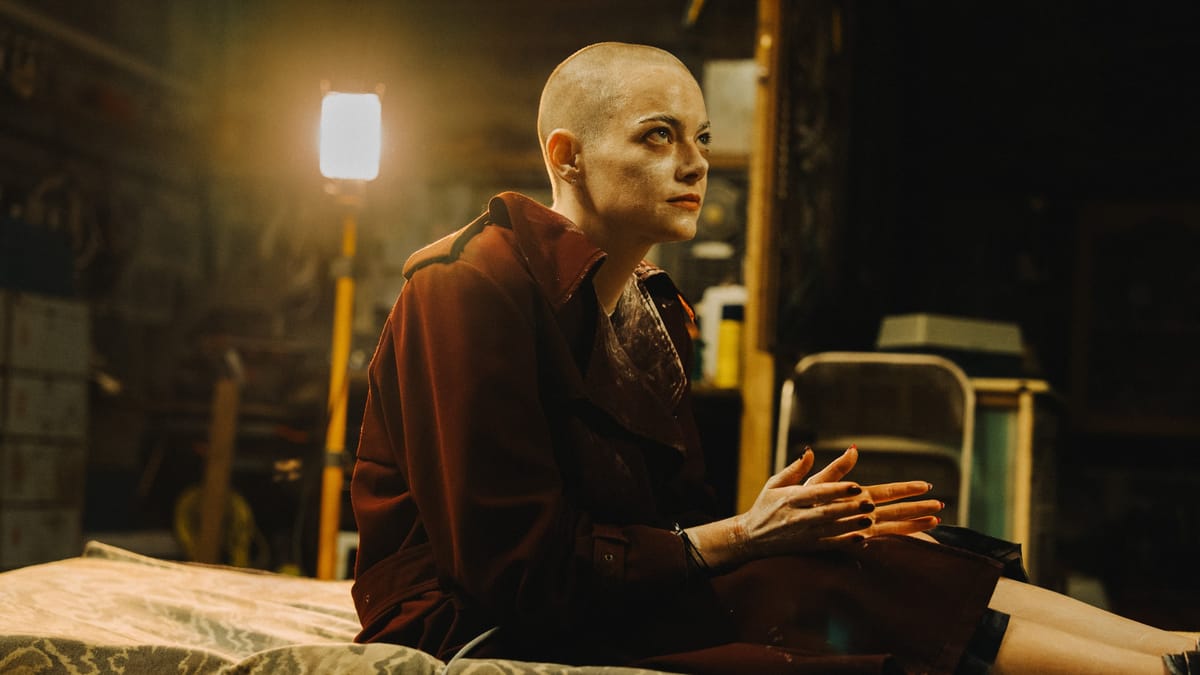Bugonia
"All we've lost. All that's been done to us. We're setting that right again."

Do you remember about twenty years ago when everyone was abuzz about the vanishing of the bees? Colony collapse disorder (CCD), it came to be called; although such incidents were hardly new, the scale was, and there were worries that it could endanger our food supply, given how crucial farmed bees are to pollination. It was such a well-known and worrisome phenomenon that it became a runner through the best season of the Dr. Who revival, used as an indication that something was wrong, a harbinger of coming doom.
Teddy (Jesse Plemmons) remembers. Maybe too well, as he seems to have missed the stabilization over the following decade. But his anxieties metastasized into paranoia before deepening into a twisted conspiratorial web that involves communication through hair and Andromadans among us and, you guessed it, the bees. He's concluded that the primary agent of the alien invasion is Michelle Fuller (Emma Stone), CEO of biotech firm Auxolith. Of course, it's entirely a coincidence that Teddy works in an Auxolith warehouse (with a conspicuous number of similarities to a certain other megacorp's fulfillment centers), and that his mother's already poor health was devastated by an experimental cancer treatment from the company.
No one is better than director Yorgos Lanthimos at melding dark foreboding with absurdist humor and creative visuals. Bugonia is uncomfortably hilarious from start to finish, beginning with a winding VO as Teddy explains his expansive theory to his cousin Donny (newcomer Aidan Delbis), whose valid questions are brushed aside by Teddy's skill at spinning bullshit. It's delivered over a series of shots showing the relatives as goofy, unkempt loners whose idea of fitness is the Superman pose, contrasted with Michelle's girlboss kickboxing and beauty routine, much of it shot from awkward angles wide lenses, to make everything feel just a little bit off.
Teddy's preposterous beliefs and his actions on behalf of them get increasing scary, made more poignant as we learn they were birthed from grief combined with stumbling upon the network of online conspiracy theorists talking about Planet X. Their kidnapping of Michelle is outwardly entertaining, as is their insistence on shaving her head and covering her in lotion to prevent contact with the mothership during the next lunar eclipse three days from now. However, every interaction with the cousins causes Michelle's desperation to increase, and we watch her cycle through multiple techniques to lessen her peril and search for escape, with the only success coming by chance after suffering great harm. Donny's presence makes the whole experience even more tragic, for while you'll be hard-pressed to feel too bad for a self-important phony like Michelle, his childlike demeanor clarifies his gullibility as worship of his cousin.
But this structure also leads to the story's lulls. The sharp back and forth between captor and captive is as funny as it is frustrating, but fails to illuminate much for us, as we're already privy to Teddy's deep, heartache-fueled delusions, if not his specific plans. Slowly learning their precise shape fills out the story's middle, as does meeting the town's hapless sheriff (Stavros Halkias), which clarifies how such a high profile figure could be missing for so many days without the investigation progressing. There are a few black & white flashbacks to really hit home how important his mother was to him. None of it shakes the feeling that we've been put into a holding pattern whose main purpose is filling in gaps left by hurling us straight into Teddy's worldview shortly before the kidnapping.
Fortunately for Lanthimos, his leads are two of the best actors working today. Without Stone and Plemmons, that dip could have drained all your goodwill before it hurtles into its bonkers finale. Instead, we see Plemmons shed his usual down-to-earth, handsome, slightly heavyset appearance, transforming into a wiry, sickly looking beanpole who unquestionably fits the part of obsessed shut-in. And Stone perfectly pulls off the smarmy CEO, full of faux-humility and unearned power, whose commitment causes us to question how much she believes what she's saying at every turn, even when it's clearly to appease her captor.
Combined with the story's satirical bent, it does mostly work. I dare you to not laugh in recognition at Michelle's anxiety about being perceived as a Silicon Valley tech bro causing her to insist employees can leave before 5:30 "If they want to. And don't have anything to do. Unless they're busy. It's fine! Go ahead. Unless you don't want to. You can stay. But...you know. Okay." Teddy's certainty, which involves a room full of Andromeda research and posters and models (both computer and physical), ensures there's fresh humor to be found even as the situation turns gruesome. Each step in their relationship introduces new awkwardness, causing you to smirk while you simultaneously wonder what the day of the lunar eclipse will bring.
But the finale, while exhilarating, is more of a mixed bag. It greatly complicates what had been the thematic thrust of the story, highlighting that Lanthimos isn't known for his political commentary, even when it works. The jangly, jazzy, discordant score plays nicely into the discomfort of the ending, as the movie crashes its ideas into each other, and we witness the wickedly funny fallout that doesn't entirely land on reexamination. True to the director's prior films, to call it a bold swing is an understatement. Rather, it takes a few turns that change the fundamental shape of the narrative, twisting up its meaning in ways that don't seem entirely intentional. It doesn't sap the rest of the movie of its value, but it does demonstrate the many pitfalls in the quest to craft meaningful and thoughtful films. That being said, the experience is always so fascinating and unique, and it delights me to no end that US movie theaters continue to showcase his work.